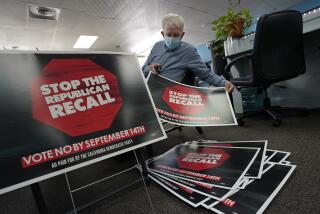Court Challenges Could Enter Uncharted Territory
- Share via
The scheduling of an election Oct. 7 isn’t likely to end the legal wrangling over how and when the vote on the recall of Gov. Gray Davis should take place. Legal experts expect that if court challenges are filed in the coming weeks they could range from who is qualified to run to whether soldiers in Iraq will have enough time to cast their ballots.
The first legal challenges were filed earlier this month, over the procedure for collecting and counting the voter signatures needed to force the election. On Thursday, the California Supreme Court was asked to halt the election until allegations of fraud in the signature-gathering process were resolved. No action has been taken, and lower courts have refused to intervene.
The process could become even more litigious, experts say, because it is the first time a statewide official has faced a recall vote and the laws governing such elections are largely untested. In some cases, the recall law conflicts with election law, experts said.
Sacramento lawyer Charles H. Bell Jr., who represents recall proponents, said he is ready to take on any legal challenges. He said the recall law clearly sets out the rules and that it can survive any lawsuits.
Three suits are pending, the most recent filed Wednesday in federal court by two San Diego law professors against Secretary of State Kevin Shelley. The professors’ suit attacks a state law that allows voters to participate in the election of a new governor only if they also cast ballots in the recall. The professors contend that the law is unconstitutional and voters should be able to select a successor to Davis without voting on the recall.
“You can vote yes or you can vote no [on the recall] or you should be able to abstain and still have your vote [for a successor] counted,” said Shaun Martin, a constitutional law professor at the University of San Diego School of Law and one of the complainants. “It deprives people of their right to vote ... and violates the 1st Amendment by essentially coercing people to vote for something they don’t want to vote on.”
Martin and Sandra L. Rierson of Thomas Jefferson School of Law, are asking U.S. District Judge Barry T. Moskowitz to order county election officials to count all ballots, regardless of whether a vote is cast on the recall.
That is just one of many issues that could draw legal challenges. Many of the scenarios being floated by election law experts involve how candidates would qualify to succeed Davis if he loses the recall vote.
That’s because state law is “internally inconsistent,” according to Richard L. Hasen, a professor at Loyola Law School in Los Angeles.
One of the most obvious problems is that the secretary of state is relying on a statute for nominating candidates for the recall ballot that specifically states that it does not apply to recall elections, Hasen said.
Some suspect a lawsuit could be filed asking a court to install Lt. Gov. Cruz Bustamante as governor, relying on the traditional line of succession.
Others say Davis should be allowed to run as a successor candidate, even though the law now bars him from doing so.
Another scenario could see the number of “no” votes cast in the recall election surpassing the number of votes received by the winner of the replacement election. Some legal experts say that Davis forces could challenge the results, arguing that an anti-recall vote is equivalent to a vote for Davis and that the governor had, in effect, received more votes than the replacement election winner, who needs only a plurality of the votes cast.
Hasen said that argument may have merit. “I think that theory would have been laughed out of court before Bush vs. Gore,” he said, referring to the U.S. Supreme Court decision that led to George W. Bush becoming president after the disputed 2000 election against former Vice President Al Gore.
And what about write-in candidates, Hasen asked. Do the same rules apply?
It might not be an issue now, he said. But what happens if Davis’ chances to survive the recall worsen and Democratic leaders want to provide voters with an alternative to a Republican-dominated slate.
Another question is the timing of the distribution of ballots.
Military personnel and others living overseas are entitled under state law to receive their ballots 60 days before an election. But in this election, candidates have until 59 days before the vote to get their names on the ballot. It is possible, therefore, that some soldiers would not get their ballots until after the election was over.
“As a result you disenfranchise them,” Martin said.
More to Read
Get the L.A. Times Politics newsletter
Deeply reported insights into legislation, politics and policy from Sacramento, Washington and beyond. In your inbox twice per week.
You may occasionally receive promotional content from the Los Angeles Times.








